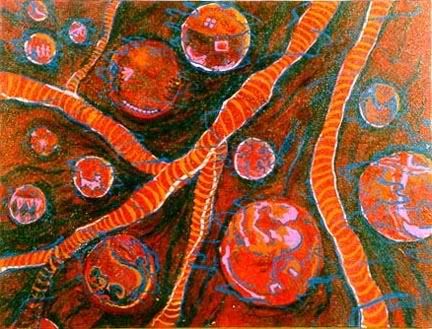Cell Communication is Raising the Bar
In order for cells to organize themselves into complex tissues so you can yap away on your cell phone, they need to communicate too. There are three commonly accepted forms of intercellular communication (see picture because my explanation will probs confuse you; i'm a visual learner too). There's paracrine signaling, in which a cell will release a ch emical messenger to communicate will NEARBY cells. Nearby is the key here, people. Then, there is synaptic signaling, in which a neurotransmitter is used to communicate an electrical signal from one neural axon to another neural dendrite (or a muscle cell or whatevs else). Not pictured (so stay with me here) is cell surface-surface communication. That is where specific receptor proteins on one cell interact with signal proteins on the surface of another cell during cell-cell contact. This induces a response in the signal-er the receptor or both.
emical messenger to communicate will NEARBY cells. Nearby is the key here, people. Then, there is synaptic signaling, in which a neurotransmitter is used to communicate an electrical signal from one neural axon to another neural dendrite (or a muscle cell or whatevs else). Not pictured (so stay with me here) is cell surface-surface communication. That is where specific receptor proteins on one cell interact with signal proteins on the surface of another cell during cell-cell contact. This induces a response in the signal-er the receptor or both. Those are all short distance signaling. Long-distance signaling is called endocrine signaling, which uses hormones to communicate messages to specific tissues or cells in the body. I mean, your pancreas can't just pick up a tin can and say "Liver, WTF? Take up some of this goddamn glucose and convert it into glycogen before you fuck everyone's shit up." No, a message as poignant and critical needs an intricate system of communication, not some retard 19th century P.O.S.
Those are all short distance signaling. Long-distance signaling is called endocrine signaling, which uses hormones to communicate messages to specific tissues or cells in the body. I mean, your pancreas can't just pick up a tin can and say "Liver, WTF? Take up some of this goddamn glucose and convert it into glycogen before you fuck everyone's shit up." No, a message as poignant and critical needs an intricate system of communication, not some retard 19th century P.O.S.
But what if the cell is developing? What if this communication is a one time thing which is necessary for beginning an essential cascade of signals during tissue development? Well, Valadi and

No comments:
Post a Comment